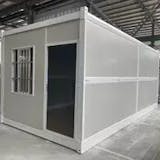Ashburn, a thriving suburban community in Virginia, is becoming increasingly popular among those seeking sustainable living options. Tiny homes, known for their minimalistic design and eco-friendly features, are playing a significant role in this shift towards greener living. This article explores the environmental benefits of tiny homes and how they contribute to sustainable living in Ashburn.
The Environmental Benefits of Tiny Homes
1. Reduced Energy Consumption
Tiny homes are inherently more energy-efficient than traditional homes due to their smaller size. With less space to heat, cool, and light, tiny homes require significantly less energy, leading to lower utility bills and a reduced carbon footprint.
2. Use of Sustainable Materials
Many tiny home builders prioritize the use of sustainable and recycled materials in construction. This not only reduces the environmental impact of the building process but also ensures that the homes are healthier for their occupants.
3. Lower Water Usage
Tiny homes typically incorporate water-saving fixtures and appliances, such as low-flow showerheads and composting toilets. These features help to conserve water, a crucial aspect of sustainable living.
4. Minimal Land Impact
Due to their small footprint, tiny homes require less land, which means less disruption to the natural environment. This makes them an ideal choice for those looking to minimize their ecological impact.
5. Off-Grid Living Options
Many tiny homes are designed to be off-grid, utilizing solar panels, rainwater collection systems, and composting toilets. This allows residents to live independently of municipal utilities, further reducing their environmental impact.
Sustainable Living in Ashburn
1. Community Initiatives
Ashburn is home to several initiatives and organizations dedicated to promoting sustainable living. These include community gardens, farmers' markets, and local environmental groups that encourage residents to adopt greener lifestyles.
2. Green Building Regulations
Ashburn and the surrounding Loudoun County have implemented green building regulations to promote energy efficiency and sustainability in new construction. Tiny homes in this area often exceed these standards due to their eco-friendly design.
3. Access to Nature
Ashburn offers ample opportunities for outdoor recreation, with numerous parks, trails, and nature preserves. Living in a tiny home allows residents to fully embrace the natural beauty of the area while minimizing their environmental impact.
Tiny Home Communities in Ashburn
1. Brambleton
Brambleton, a master-planned community in Ashburn, is exploring the integration of tiny homes into its development. This community emphasizes walkability, green spaces, and sustainable living practices, making it an ideal setting for tiny homes.
2. Loudoun Valley
Loudoun Valley is another community in Ashburn that promotes sustainable living. With its focus on green building practices and environmental stewardship, it provides a supportive environment for tiny home enthusiasts.
Laws and Regulations for Tiny Homes in Ashburn
Zoning and Building Codes
In Ashburn, tiny homes are subject to local zoning and building codes, which vary depending on the size and type of the dwelling. Tiny homes that are 400 square feet or less are generally classified as accessory dwelling units (ADUs) and must comply with specific regulations regarding placement and use. Homes larger than 400 square feet are considered traditional dwellings and must meet standard residential building codes.
Permitting Process
To place a tiny home in Ashburn, you must obtain the necessary permits, including building, electrical, and plumbing permits. This process ensures that the home meets all safety and health standards. Consulting with local authorities or a knowledgeable builder can help streamline the permitting process.
Conclusion
Tiny homes are an excellent option for those looking to embrace sustainable living in Ashburn. Their energy efficiency, use of sustainable materials, and minimal land impact make them a green choice for eco-conscious residents. With supportive community initiatives and favorable regulations, Ashburn is well-positioned to become a leader in the tiny home movement.
FAQs
| Question | Answer |
|---|---|
| What are the environmental benefits of tiny homes? | Tiny homes reduce energy consumption, use sustainable materials, conserve water, and have a minimal land impact. |
| How can tiny homes contribute to sustainable living in Ashburn? | Tiny homes in Ashburn promote energy efficiency, lower water usage, and offer off-grid living options, all of which contribute to a greener lifestyle. |
| Are there any tiny home communities in Ashburn? | Yes, communities like Brambleton and Loudoun Valley are exploring the integration of tiny homes and promoting sustainable living practices. |
| What are the zoning regulations for tiny homes in Ashburn? | Tiny homes under 400 square feet are classified as accessory dwelling units (ADUs) and must comply with specific regulations. Larger homes must meet standard codes. |
| How do I obtain permits for a tiny home in Ashburn? | You need to obtain building, electrical, and plumbing permits from local authorities. Working with a knowledgeable builder can help streamline the process. |
| What initiatives support sustainable living in Ashburn? | Community gardens, farmers' markets, and local environmental groups in Ashburn encourage residents to adopt greener lifestyles and support sustainable living. |








